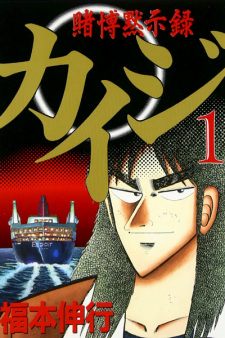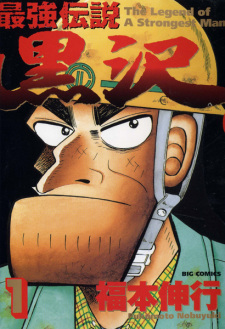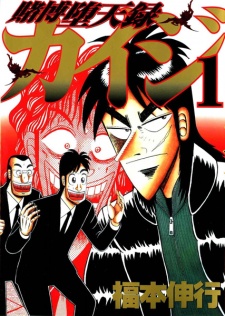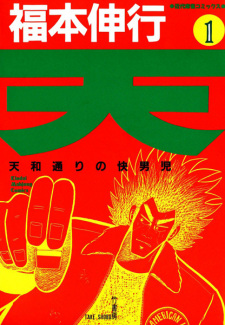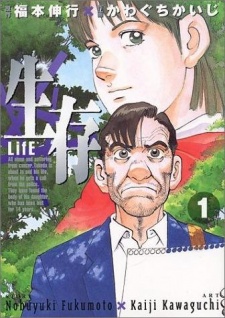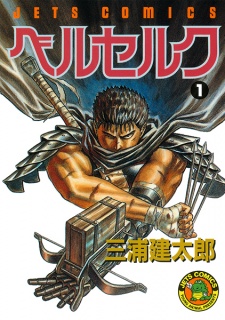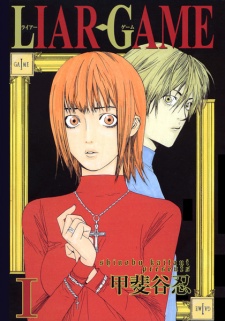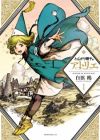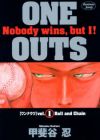Nobuyuki Fukumoto for Beginners
Manga
Nobuyuki Fukumoto is one of the quintessential authors in the world of psychological/suspense manga, but his lengthy mangaography and atypical art style may be a little intimidating for newcomers. I've compiled a list of what I would consider his core works, and a recommended reading order.
Manga, 13 vol, 1996
Me:-
Author:10
Note: I highly recommend that newcomers watch the anime adaptation first, as the art style is more polished, and the voice acting and soundtrack are superb.
Fukumoto's career took off with Kaiji, and for good reason. It's also easily the best place to start as it features all of the best facets of his work: simple but well thought out gambles, atmosphere absolutely dripping with tension, and the emotional, psychological view into the mindset of a flawed but earnest underdog.
Fukumoto's career took off with Kaiji, and for good reason. It's also easily the best place to start as it features all of the best facets of his work: simple but well thought out gambles, atmosphere absolutely dripping with tension, and the emotional, psychological view into the mindset of a flawed but earnest underdog.
Manga, 13 vol, 2000
Me:-
Author:9
Note: I highly recommend that newcomers watch the anime adaptation first for the same reasons as above, despite some pacing issues.
The Kaiji series continues in full force in part 2 of the series. The gambles are little more esoteric compared to the first series, but all of the tension and emotion are still there.
The next part of the series is even more esoteric as it focuses on riichi mahjong and isn't novice-friendly, so I would recommend taking a detour to other series first.
The Kaiji series continues in full force in part 2 of the series. The gambles are little more esoteric compared to the first series, but all of the tension and emotion are still there.
The next part of the series is even more esoteric as it focuses on riichi mahjong and isn't novice-friendly, so I would recommend taking a detour to other series first.
Manga, 36 vol, 1991
Me:-
Author:9
Note: I cannot recommend enough that newcomers watch the anime adaptation first, for the same reasons as above but also due to the subject matter.
Many of Fukumoto's manga revolve around riichi mahjong, and anyone who's wanted to get into his works has faced the prospect of either learning a complex tile game just to read a manga, or go in blind. Akagi is still extremely enjoyable even if you don't understand what's happening, so it's better to watch it before reading Kaiji part 3 in my opinion. It also presents a polar opposite story to Kaiji, where the protagonist always wins with ease, but the excitement is in how he manages to get out of predicaments without breaking a sweat.
Many of Fukumoto's manga revolve around riichi mahjong, and anyone who's wanted to get into his works has faced the prospect of either learning a complex tile game just to read a manga, or go in blind. Akagi is still extremely enjoyable even if you don't understand what's happening, so it's better to watch it before reading Kaiji part 3 in my opinion. It also presents a polar opposite story to Kaiji, where the protagonist always wins with ease, but the excitement is in how he manages to get out of predicaments without breaking a sweat.
Manga, 11 vol, 2003
Me:-
Author:10
While Kaiji and Akagi both rely on strategy and gambling to create tension, Kurosawa goes all-in on the emotional look into the psychology of an underdog, with equal parts humor and drama. The start is a little rocky, but it quickly lives up to its reputation as an undisputed classic.
Manga, 8 vol, 2007
Me:-
Author:9
Zero is basically Kaiji for kids. As a shounen manga the tone is significantly less heavy than his other more popular series, but this series has more gambles packed into it than any of the Kaiji series, and every single one of them is top notch.
The sequel is extremely polarizing within the fanbase because it's pretty different from the first series, but I'd still recommend reading it.
The sequel is extremely polarizing within the fanbase because it's pretty different from the first series, but I'd still recommend reading it.
Manga, 13 vol, 2004
Me:-
Author:9
If watching Akagi made you interested in mahjong, then congratulations! This one is going to be a really fun ride. If you aren't so enthusiastic about mahjong or went straight to here after reading part 2, it might be a little harder to enjoy. But either way, part 3 of Kaiji still has everything that made the first 2 parts so great.
After reading part 3, you'll basically be a Kaiji fan, and won't need me to tell you to read parts 4 and onwards.
After reading part 3, you'll basically be a Kaiji fan, and won't need me to tell you to read parts 4 and onwards.
Manga, 5 vol, 2000
Me:-
Author:7
Buraiden Gai is an unfortunate case of a series that could've been brilliant if it didn't get cut short. But it's still a thoroughly engrossing read, and a fan favorite for good reason.
Manga, 11 vol, 1992
Me:-
Author:8
Gin to Kin has so many things making it difficult to recommend to newcomers, with esoteric political intrigue, wonky art, a whole mahjong arc, and a less than stellar ending because the magazine it was serialized in changed into a hentai magazine (LOL). But if you can get past all of that, it makes up for its shortcomings with pure charm (and all the tension and suspense that you'd expect from any good Fukumoto manga).
Manga, 18 vol, 1989
Me:-
Author:10
I'll be straight with you: Ten is my favorite Fukumoto manga by a mile. I originally read it without knowing mahjong, and it was great, especially the final arc. When I learned mahjong, I reread the series, and it absolutely blew me away. I think it's still worth reading even without mahjong knowledge because the final arc is an absolute masterpiece, but the mahjong in the series is probably the most technical of any Fukumoto series (and a little dry at that) so it's not for everyone.
Manga, 3 vol, 1999
Me:-
Author:8
Life (and its "sister" manga, Confession), was drawn by the eminent Kaiji Kawaguchi, but Fukumoto's storytelling is still unmistakable. If you've made it this far, then you're probably a fully-fledged Fukumoto fan, and can explore the rest of his expansive mangaography as you please. Enjoy!
